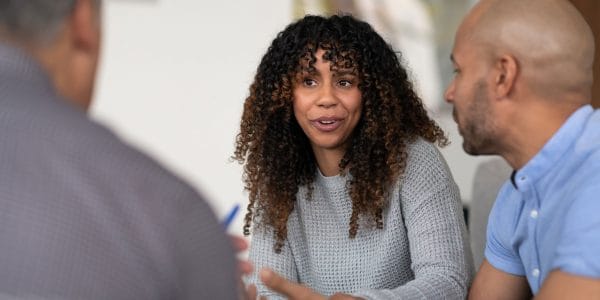We have funded research to help divorcing couples share their pensions more fairly, and to provide essential guidance for legal professionals.
Hilary Woodward’s project on pensions on divorce led to the establishment of the Pensions Advisory Group (PAG), who have published two essential guides to help practitioners and couples navigate this complex issue.
The free guides offer clear, step-by-step advice to make sure couples receive the settlements they deserve.
Why is it important to share pensions on divorce?
- Pensions are often the second-largest asset in any divorce settlement, after property.
- There is a misperception that pensions are only a concern for older people or the wealthy. However, many jobs have valuable pensions, especially in the public sector.
- Research shows that not sharing pensions can leave divorced women in a precarious financial position as they get older. Many women have smaller pensions than their male partners as a result of working part time or taking career breaks to look after children. Divorced women over 65 have a median income below the poverty line.
I hope that the PAG report will assist a more consistent and better informed approach to the treatment of pensions on divorce. Pensions on divorce remain, perhaps, the last bastion of unintended discrimination against women in family law.Rhys Taylor, Barrister
Our research into pensions on divorce
We funded Hilary Woodward, an expert sociolegal researcher at Cardiff University and a former family solicitor, to carry out a study on this issue in 2012.
The project was the first empirical study in this area since pension sharing was introduced in England and Wales in December 2000. Before pensions were included as marital assets, a spouse who did not work during the marriage might be left without a pension after a divorce.
Hilary Woodward’s research found:
- Despite the positive change in the law, legal practitioners lacked confidence in how to tackle pensions when dividing assets.
- Fewer than one in six divorces included a pension order of any kind.
- Case law offered little guidance on pensions on divorce. It is mainly geared towards cases dealing with larger amounts of money.
- Many divorcing couples received potentially unfair outcomes. This was a result of widespread misunderstanding and poor quality pension disclosure on court files.
- Legal professionals were left vulnerable to alleged negligence claims.
A new guide for practitioners
The Pensions Advisory Group (PAG) builds on the Pensions on divorce project to address this important knowledge gap and create the tools practitioners need.
The Pensions Advisory Group was established in 2017 and is chaired by Mr Justice Francis and His Honour Judge Edward Hess, and is supported by the Family Justice Council and the President of the Family Division. The interdisciplinary working group brings together practicing legal professionals with academics and financial experts. It provides in-depth analysis on how to approach pensions on divorce.
We gave the Pensions Advisory Group partial funding to produce a practitioner guide to pensions on divorce, published in July 2019.
The guide helps family judges, lawyers and pension experts to:
- Achieve fairer settlements and manage liability.
- Understand the jargon of pensions and what they need to look out for.
- Identify when they should seek specialist advice. This helps practitioners to protect themselves from negligence claims, as well as achieve the best outcome for their clients.
The guide has been downloaded over 8,000 times and has made a significant impact. In 2020, the Pensions Advisory Group was awarded the John Cornell Award for an outstanding contribution to family law by the family lawyers organisation Resolution.
The guide has been adopted by the Financial Remedies Courts Good Practice Protocol. It also informs the work of the charity Surviving Economic Abuse. The guide has been referenced in a number of court cases, including one where an expert report was rejected because it was deemed not to have followed its recommendations.
The practitioner guide can be downloaded for free, or a hard copy is available for £19.99.
A new easy-to-read guide for divorcing couples
After the success of the practitioner guide, we funded the Pensions Advisory Group to publish a free guide for divorcing couples themselves.
People often see pensions as daunting, but the guide explains why it’s vital to consider them during your divorce. It offers clear, step-by-step advice on how to make sure spouses receive the settlements they deserve.
Pensions on divorce: what should you do?
The Survival guide to pensions on divorce, produced by Advicenow, covers:
- What the law says about pensions.
- How to find out what they’re worth.
- When to get expert advice, and how to find an advisor.
- What to do if you can’t reach an agreement.
The guide is free to download, making the advice available to all who need it.
Better outcomes for the future
An understanding of how to approach pensions on divorce, enables legal professionals to be better equipped to achieve fair settlements for their clients and ensure clients receive the later-life income they deserve.
Splitting pensions fairly in a divorce can prevent profound and long lasting effects for those involved. However, it is easy to see how pensions, which are often perceived as complex and quite intangible, are overlooked and avoided during a time of emotional stress and potentially immediate financial uncertainty. We welcome the publication of this survival guide which demystifies the process of pension separation and equips divorcing couples with the information they need to achieve a fairer settlement.Ash Patel, Justice Programme Head at the Nuffield Foundation




































